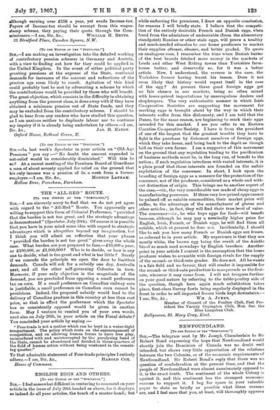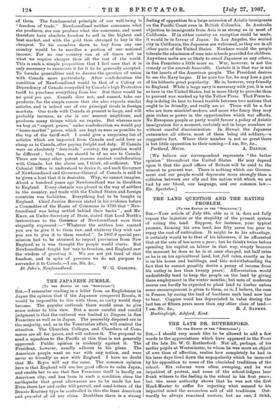NEWFOUNDLAND.
[To THE EDTTOR OF THE "SPECTATOR:"] Sfd,—The telegram sent by Mr. Joseph Chamberlain to Sir Robert Bond expressing the hope that Newfoundland would shortly join the Dominion of Canada was no doubt well intended, but shows very little appreciation of the relations between the two Colonies, or of the economic requirements of Newfoundland. Sir Robert Bond's reply that there was no question of confederation at the present time, and that the people of Newfoundland were almost unanimously opposed to it, is the exact truth. The sentiment of the whole Colony is against it, and this sentiment has the strongest economic reasons to support it. I beg for space in your valuable paper to state as briefly as possible what these reasons are, and I feel sure that you, at least, will thoroughly approve of them. The fundamental principle of our wellbeing is "freedom of trade." Newfoundland neither consumes what she produces, nor can produce what she consumes, and must therefore have absolute freedom to sell in the highest and best market, and with the gold thus obtained to buy in the cheapest. To tie ourselves down to buy from any one country would be to sacrifice a portion of our national income. For no one country can at all times sell us what we require cheaper than all the rest of the world. This is such a simple proposition that I feel sure that it is only necessary to enunciate it for it. to be generally accepted. To forsake generalities and to discuss the question of union with .Canada more particularly. After confederation the condition of Newfoundland would be that of a Colony or Dependency of Canada compelled by Canada's high Protective tariff to purchase everything from her. But there would be no quid pro quo. Canada does not, and cannot, take our products, for the simple reason that she also exports similar articles, and is indeed one of our principal rivals in foreign markets. Our trade with Canada at present is large, and will probably increase, as she is our nearest neighbour, and produces many things which we require. But whereas now we buy at "export prices," under confederation we would pay " home-market " prices, which are kept as near as possible to the top of the tariff-wall. I could give a surprising list of articles which are imported from. Canada and sold, here as cheap as in Canada, after paying freight and duty. If Canada were an absolutely " free-trade " country, the question would be different ; but, then, we should be of no use to Canada. There are many other potent reasons against confederation with Canada, but the above are, I think, all-sufficient. The Colonial Office is understood to desire it, and each Governor of Newfoundland and Governor-General of Canada is said to be given a hint that it is desirable. Why, we cannot imagine. A bout a hundred years ago Newfoundland was in thraldom to England. Every obstacle was placed in the way of settlers in the country, and trade with the United States and foreign countries was forbidden. Everything had to be bought in England. Chief Justice Reeves stated in his evidence before a Committee of the House of Commons in 1793 that "New- foundland was being settled behind their backs " ; and Mr. Knox, an Under-Secretary of State, stated that Lord North's instructions to the Governor of Newfoundland were thus elegantly expressed :—" Whatever the settlers love roasted you are to give it to them raw, and whatever they wish raw you are to give it to them roasted." In 1807-9 special per- mission had to be obtained to import provisions from New England, as it was thought the people would starve. But Newfoundland fought her way to freedom, and England saw the wisdom of granting it. We are not yet tired of that freedom, and in spite of pressure we do not purpose to surrender it to Canada.—I am, Sir, &c.,







































 Previous page
Previous page